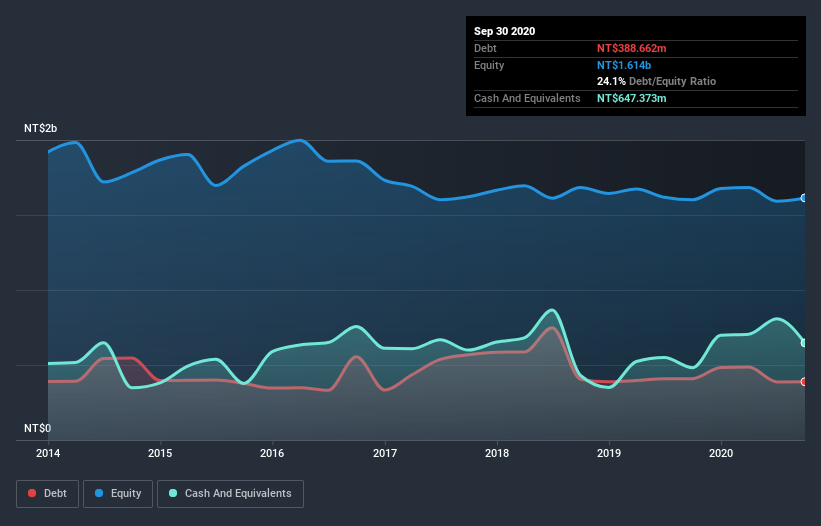- Taiwan
- /
- Medical Equipment
- /
- TWSE:1733
These 4 Measures Indicate That Apex Biotechnology (TPE:1733) Is Using Debt Safely
David Iben put it well when he said, 'Volatility is not a risk we care about. What we care about is avoiding the permanent loss of capital.' When we think about how risky a company is, we always like to look at its use of debt, since debt overload can lead to ruin. We note that Apex Biotechnology Corp. (TPE:1733) does have debt on its balance sheet. But should shareholders be worried about its use of debt?
What Risk Does Debt Bring?
Generally speaking, debt only becomes a real problem when a company can't easily pay it off, either by raising capital or with its own cash flow. Part and parcel of capitalism is the process of 'creative destruction' where failed businesses are mercilessly liquidated by their bankers. However, a more usual (but still expensive) situation is where a company must dilute shareholders at a cheap share price simply to get debt under control. By replacing dilution, though, debt can be an extremely good tool for businesses that need capital to invest in growth at high rates of return. The first thing to do when considering how much debt a business uses is to look at its cash and debt together.
View our latest analysis for Apex Biotechnology
What Is Apex Biotechnology's Net Debt?
You can click the graphic below for the historical numbers, but it shows that Apex Biotechnology had NT$388.7m of debt in September 2020, down from NT$408.7m, one year before. But on the other hand it also has NT$647.4m in cash, leading to a NT$258.7m net cash position.

A Look At Apex Biotechnology's Liabilities
According to the last reported balance sheet, Apex Biotechnology had liabilities of NT$894.8m due within 12 months, and liabilities of NT$126.2m due beyond 12 months. Offsetting these obligations, it had cash of NT$647.4m as well as receivables valued at NT$467.1m due within 12 months. So it can boast NT$93.5m more liquid assets than total liabilities.
This short term liquidity is a sign that Apex Biotechnology could probably pay off its debt with ease, as its balance sheet is far from stretched. Simply put, the fact that Apex Biotechnology has more cash than debt is arguably a good indication that it can manage its debt safely.
On top of that, Apex Biotechnology grew its EBIT by 81% over the last twelve months, and that growth will make it easier to handle its debt. When analysing debt levels, the balance sheet is the obvious place to start. But it is Apex Biotechnology's earnings that will influence how the balance sheet holds up in the future. So if you're keen to discover more about its earnings, it might be worth checking out this graph of its long term earnings trend.
Finally, while the tax-man may adore accounting profits, lenders only accept cold hard cash. Apex Biotechnology may have net cash on the balance sheet, but it is still interesting to look at how well the business converts its earnings before interest and tax (EBIT) to free cash flow, because that will influence both its need for, and its capacity to manage debt. Over the last three years, Apex Biotechnology recorded free cash flow worth a fulsome 86% of its EBIT, which is stronger than we'd usually expect. That positions it well to pay down debt if desirable to do so.
Summing up
While we empathize with investors who find debt concerning, you should keep in mind that Apex Biotechnology has net cash of NT$258.7m, as well as more liquid assets than liabilities. The cherry on top was that in converted 86% of that EBIT to free cash flow, bringing in NT$276m. The bottom line is that we do not find Apex Biotechnology's debt levels at all concerning. The balance sheet is clearly the area to focus on when you are analysing debt. However, not all investment risk resides within the balance sheet - far from it. Consider for instance, the ever-present spectre of investment risk. We've identified 3 warning signs with Apex Biotechnology (at least 1 which shouldn't be ignored) , and understanding them should be part of your investment process.
At the end of the day, it's often better to focus on companies that are free from net debt. You can access our special list of such companies (all with a track record of profit growth). It's free.
If you decide to trade Apex Biotechnology, use the lowest-cost* platform that is rated #1 Overall by Barron’s, Interactive Brokers. Trade stocks, options, futures, forex, bonds and funds on 135 markets, all from a single integrated account. Promoted
New: Manage All Your Stock Portfolios in One Place
We've created the ultimate portfolio companion for stock investors, and it's free.
• Connect an unlimited number of Portfolios and see your total in one currency
• Be alerted to new Warning Signs or Risks via email or mobile
• Track the Fair Value of your stocks
This article by Simply Wall St is general in nature. It does not constitute a recommendation to buy or sell any stock, and does not take account of your objectives, or your financial situation. We aim to bring you long-term focused analysis driven by fundamental data. Note that our analysis may not factor in the latest price-sensitive company announcements or qualitative material. Simply Wall St has no position in any stocks mentioned.
*Interactive Brokers Rated Lowest Cost Broker by StockBrokers.com Annual Online Review 2020
Have feedback on this article? Concerned about the content? Get in touch with us directly. Alternatively, email editorial-team@simplywallst.com.
About TWSE:1733
Apex Biotechnology
Researches, develops, manufactures, and sells home care medical devices by using biosensor technology worldwide.
Flawless balance sheet with proven track record.
Similar Companies
Market Insights
Community Narratives




